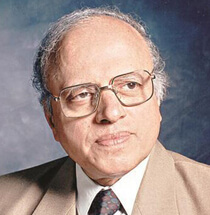Nominations for 27th Mahaveer Awards is closed


Mankombu Sambasivan Swaminathan (born 7 August 1925) is an Indian geneticist and international administrator, renowned for his leading role in India's Green Revolution, a program under which high-yield varieties of wheat and rice seedlings were planted in the fields of poor farmers. Swaminathan is known as the "Father of Indian Green Revolution" for his leadership and success in introducing and further developing high-yielding varieties of wheat in India. He is the founder and chairman of the MS Swaminathan Research Foundation. His stated vision is to rid the world of hunger and poverty. Swaminathan is an advocate of moving India to sustainable development, especially using environmentally sustainable agriculture, sustainable food security and the preservation of biodiversity, which he calls an "evergreen revolution."
From 1972 to 1979 he was director general of the Indian Council of Agricultural Research. He was Principal Secretary, Ministry of Agriculture from 1979 to 1980. He served as Director General of the International Rice Research Institute (1982–88) and became president of the International Union for the Conservation of Nature and Natural Resources in 1988.
In 1999, Time magazine placed him in the 'Time 20' list of most influential Asian people of the 20th century.
M. S. Swaminathan was born in Kumbakonam on 7 August 1925. He was the second son of surgeon Dr. M.K. Sambasivan and Parvati Thangammal Sambasivan. M.S. Swaminathan learnt from his father, "that the word 'impossible' exists mainly in our minds and that given the requisite will and effort, great tasks can be accomplished." Surgeon M.K. Sambasivam, a follower of Mahatma Gandhi, took the lead in Kumbakonam in "burning his foreign clothes," a symbolic act in support of the Swadeshi movement: which emphasized the use of Indian rather than foreign-made clothes, and handloomed rather than mill-spun cloth. The political purpose of the swadeshi movement was to free India from dependence on foreign imports and to protect village industry. His father led in opening the temples to Dalits, part of the temple entry movement of the Indian independence movement in Tamil Nadu, and in eradicating filariasis in Kumbakonom, an area long infected with the dreaded disease[citation needed]. The sense of service to one's fellow man was thus ingrained in him early.
After his father's death when he was 11, young Swaminathan was looked after by his uncle, M. K. Narayanaswami, a radiologist. He attended the local high school and later the Catholic Little Flower High School in Kumbakonom, from which he matriculated at age 15.Coming from a family of doctors, he naturally took admission in a medical school. But, when he witnessed the Great Bengal famine of 1943, he decided to devote his life for getting rid of hunger from India. He was influenced by Mahatma Gandhi while he took this decision. He simply switched from the medical field to the agricultural field. He then went on to finish his undergraduate degree at Maharaja's College in Trivandrum, Kerala (now known as University College, Thiruvananthapuram). He studied there from 1940–44 and earned a Bachelor of Science degree in zoology.
M.S. Swaminathan is married to Mina Swaminathan, whom he met in 1951 while they were both studying at Cambridge. They live in Chennai, Tamil Nadu. They have three daughters and five grandchildren. Their daughters are Dr. Soumya Swaminathan, the Deputy Director General of World Health Organization, Dr. Madhura Swaminathan, who is a Professor of Economics at the Indian Statistical Institute, Bangalore and Nitya Swaminathan, a Senior Lecturer in Gender Analysis and Development at the University of East Anglia. Swaminathan and Mina have 5 grandchildren.
Swaminathan then decided to pursue a career in agricultural sciences. He enrolled in Madras Agricultural College ( now the Tamil Nadu Agricultural University ) where he graduated as valedictorian with another Bachelor of Science degree, this time in Agricultural Science. He explained this career decision thus: "My personal motivation started with the great [Bengal famine of 1943], when I was a student at the University of Kerala. There was an acute rice shortage, and in Bengal about 3 million people died from starvation. All of our young people, myself included, were involved in the freedom struggle, which Gandhi had intensified, and I decided I should take to agricultural research in order to help farmers produce more."
In 1947, the year of Indian independence he moved to the Indian Agricultural Research Institute (IARI) in New Delhi as a post-graduate student in genetics and plant breeding. He obtained a post-graduate degree with high distinction in Cytogenetics in 1949. He wrote the Union Public Service Commission exam and qualified for the Indian Police Service.
He chose to accept the UNESCO Fellowship to continue his IARI research on potato genetics at the Wageningen Agricultural University, Institute of Genetics in the Netherlands. Here he succeeded in standardising procedures for transferring genes from a wide range of wild species of Solanum to the cultivated potato, Solanum tuberosum. In 1950, he moved to study at the Plant Breeding Institute of the University of Cambridge School of Agriculture. He earned a Doctor of Philosophy (PhD) degree in 1952, for his thesis, "Species Differentiation, and the Nature of Polyploidy in certain species of the genus Solanum – section Tuberarium." His work presented a new concept of the species relationships within the tuber-bearing Solanum. His Cambridge college, Fitzwilliam, made him an Honorary Fellow in 2014.
Swaminathan then accepted a post-doctoral research associateship at the University of Wisconsin, Department of Genetics to help set up a USDA potato research station. Despite his strong personal and professional satisfaction with the research work in Wisconsin, he declined the offer of a full-time faculty position, returning to India in early 1954.
Swaminathan has worked worldwide in collaboration with colleagues and students on a wide range of problems in basic and applied plant breeding, agricultural research and development and the conservation of natural resources.
He holds more than 50 honorary Doctorate degrees from universities around the world.
National Awards
International Awards